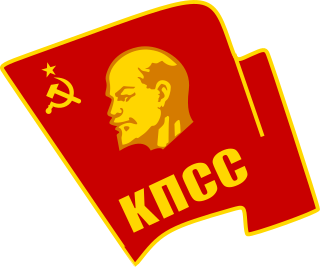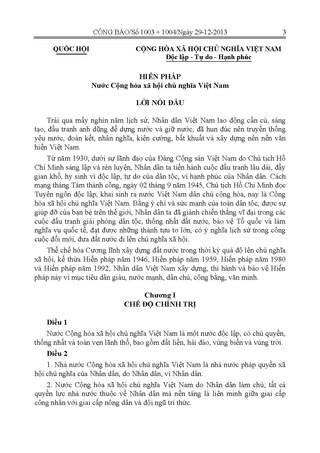Related Research Articles

The Communist Party of the Soviet Union (CPSU), at some points known as the Russian Communist Party (Bolsheviks) and All-Union Communist Party (Bolsheviks), sometimes referred to as the Soviet Communist Party (SCP), and formerly known as the Bolshevik Party, was the founding and ruling political party of the Soviet Union. The CPSU was the sole governing party of the Soviet Union until 1990 when the Congress of People's Deputies modified Article 6 of the 1977 Soviet Constitution, which had previously granted the CPSU a monopoly over the political system. The party's main ideology was Marxism-Leninism.

The Supreme Soviet of the Union of Soviet Socialist Republics was, beginning in 1936, the most authoritative legislative body of the Union of Soviet Socialist Republics (USSR), and the only one with the power to approve constitutional amendments. Prior to 1936, the Congress of Soviets was the supreme legislative body. During 1989–1991 a similar, but not identical structure was the supreme legislative body. The Supreme Soviet appointed the Council of Ministers, the Supreme Court, and the Procurator General of the USSR as well as elected the Presidium which served as the USSR's collective head of state by the both 1936 and 1977 Soviet Constitution.

A communist state, also known as a Marxist–Leninist state, is a one-party state that is administered and governed by a communist party guided by Marxism–Leninism. Marxism–Leninism was the state ideology of the Soviet Union, the Comintern after Bolshevisation and the communist states within the Comecon, the Eastern Bloc, and the Warsaw Pact. Marxism–Leninism currently still remains the ideology of a few parties around the world. After its peak when many communist states were established, the Revolutions of 1989 brought down most of the communist states, however, it is still the official ideology of the ruling parties of China, Cuba, Laos, Vietnam, and to a lesser extent, North Korea. During most of the 20th century, before the Revolutions of 1989, around one-third of the world's population lived under communist states.

The Sino-Soviet split was the gradual deterioration of relations between China and the Soviet Union caused by doctrinal divergences that arose from their different interpretations and practical applications of Marxism–Leninism, as influenced by their respective geopolitics during the Cold War of 1947–1991. In the late 1950s and early 1960s, Sino-Soviet debates about the interpretation of orthodox Marxism became specific disputes about the Soviet Union's policies of national de-Stalinization and international peaceful coexistence with the Western Bloc, which Chinese founding father Mao Zedong decried as revisionism. Against that ideological background, China took a belligerent stance towards the Western world, and publicly rejected the Soviet Union's policy of peaceful coexistence between the Western Bloc and Eastern Bloc. In addition, Beijing resented the Soviet Union's growing ties with India due to factors such as the Sino-Indian border dispute, and Moscow feared that Mao was too nonchalant about the horrors of nuclear warfare.
The 1936 Constitution of the Soviet Union, also known as the Stalin Constitution, was the constitution of the Soviet Union adopted on 5 December 1936.
The 1977 Constitution of the Soviet Union, officially the Constitution of the Union of Soviet Socialist Republics, was the constitution of the Soviet Union adopted on 7 October 1977.

State atheism or atheist state is the incorporation of hard atheism or non-theism into political regimes. It is considered the opposite of theocracy and may also refer to large-scale secularization attempts by governments. To some extent, it is a religion-state relationship that is usually ideologically linked to irreligion and the promotion of irreligion or atheism. State atheism may refer to a government's promotion of anti-clericalism, which opposes religious institutional power and influence in all aspects of public and political life, including the involvement of religion in the everyday life of the citizen. In some instances, religious symbols and public practices that were once held by religions were replaced with secularized versions of them. State atheism can also exist in a politically neutral fashion, in which case, it is considered non-secular.

The Vietnamese Constitution or the Constitution of Vietnam, fully the Constitution of the Socialist Republic of Vietnam, is the fundamental and supreme law of the state of Socialist Republic of Vietnam. The current version of Vietnamese Constitution was adopted on November 28, 2013, by the Thirteenth National Assembly, and took effect on January 1, 2014, being the fourth "generation" of constitution adopted by the Vietnamese state since the political reunification of the country in 1976.

The political system of the Soviet Union took place in a federal single-party soviet socialist republic framework which was characterized by the superior role of the Communist Party of the Soviet Union (CPSU), the only party permitted by the Constitution.

Demokratizatsiya was a slogan introduced by Soviet Communist Party General Secretary Mikhail Gorbachev in January 1987 calling for the infusion of "democratic" elements into the Soviet Union's single-party government. Gorbachev's Demokratizatsiya meant the introduction of multi-candidate—though not multiparty—elections for local Communist Party (CPSU) officials and Soviets. In this way, he hoped to rejuvenate the party with progressive personnel who would carry out his institutional and policy reforms. The CPSU would retain sole custody of the ballot box.

Mykolas Burokevičius was a communist political leader in Lithuania. After the Communist Party of Lithuania separated from the Communist Party of the Soviet Union (CPSU), he established alternative pro-CPSU Communist Party of Lithuania in early 1990, and led it as the First Secretary of Central Committee until its ban in 1991. He was the only Lithuanian to serve in the Politburo of the CPSU Central Committee, and did so from 1990 until its ban in 1991.

Before the perestroika Soviet era reforms of Gorbachev that promoted Eurocommunism, the majority of its history it went the formal ideology of the Communist Party of the Soviet Union (CPSU) was Marxism–Leninism, a form of socialism consisting of a centralised command economy with a vanguardist one-party state that aimed to realize the dictatorship of the proletariat. The Soviet Union's ideological commitment to achieving communism included the national communist development of socialism in one country and peaceful coexistence with capitalist countries while engaging in anti-imperialism to defend the international proletariat, combat the predominant prevailing global system of capitalism and promote the goals of Russian Communism. The state ideology of the Soviet Union—and thus Marxism–Leninism—derived and developed from the theories, policies and political praxis of Marx, Lenin and Stalin.

The electoral system of the Soviet Union was varying over time, being based upon Chapter XIII of the provisional Fundamental Law of 1922, articles 9 and 10 of the 1924 Constitution and Chapter XI of the 1936 Constitution, with the electoral laws enacted in conformity with those. The Constitution and laws applied to elections in all Soviets, from the Supreme Soviet of the Soviet Union, the Union republics and autonomous republics, through to regions, districts and towns. Voting was claimed to be secret and direct with universal suffrage. However, in practice, before 1989, voters could vote against candidates preselected by the Communist Party only by spoiling their ballots, whereas votes for the party candidates could be cast simply by submitting a blank ballot.

The Government of the Soviet Union, formally the All-Union Government of the Union of Soviet Socialist Republics, commonly abbreviated to Soviet Government, was the executive and administrative organ of state in the former Soviet Union. It had four different names throughout its existence; Council of People's Commissars (1923–1946), Council of Ministers (1946–1991), Cabinet of Ministers and Committee on the Operational Management of the National Economy. It also was known as Workers-Peasants Government of the Soviet Union during the Stalin era.

The Congress of People's Deputies of the Soviet Union was the highest body of state authority of the Soviet Union from 1989 to 1991.

The Council of Ministers of the Union of Soviet Socialist Republics, was the de jure government of the Union of Soviet Socialist Republics (USSR), comprising the main executive and administrative agency of the USSR from 1946 until 1991.

The Constitution of Uzbekistan of 1978 was adopted on 19 April 1978 at the extraordinary session of the Supreme Soviet of Uzbekistan. The Constitution of Uzbekistan of 1978 contains 11 parts and it is further divided into 21 chapters.
Hisotorically, vanguardism is an aspect of communist or socialist revolutions, of which the 20th century has seen two major cases- those of China in 1949 and Russia in 1911. Ideologically, and in the context of Leninist revolutionary struggle, vanguardism relates to a strategy whereby the most class-conscious and politically "advanced" sections of the proletariat or working class, described as the revolutionary vanguard, form organizations to advance the objectives of communism. Those working class members and/ or organizations take actions to draw larger sections of the working class toward revolutionary politics and to serve as manifestations of proletarian political power opposed to the bourgeoisie.

Democratic centralism is the organisational principle of socialist states and of most communist parties. In practice, democratic centralism means that political decisions reached by voting processes are binding upon all members of the political party. It is mainly associated with Leninism, wherein the party's political vanguard of revolutionaries practice democratic centralism to select leaders and officers, determine policy, and execute it.
References
- ↑ "Law of the USSR of March 14, 1990 N 1360-I 'On the establishment of the office of the President of the USSR and the making of changes and additions to the Constitution (Basic Law) of the USSR'". Garant.ru. Retrieved 12 July 2010.
- ↑ "Отмена 6-й статьи Конституции СССР о руководящей роли КПСС. Справка". RIA Novosti. 14 March 2010. Archived from the original on 14 June 2010. Retrieved 12 July 2010.